by Dimitrios Koutsoubos
In this single article you will find the 5 best investing books, very carefully selected: (1)The one to start with, (2) the “bible” of investing, (3) the most inspiring story, (4) the most practical, (5) the mind-changing one, if you are already advanced.
[Read the article below or watch the video above. Find the links for the books in the article]
People put a huge effort to have a good career and struggle to improve their financial position. When they succeed and accumulate significant wealth they come across a harder problem. First, they don’t know how to safeguard the product of their hard work, and then they have no idea how to take advantage of this wealth. Investments can be very profitable in the long-term, but also can be very risky.
After 20 years of constantly investing, I can share that the biggest risk is in your own behaviour, thinking and actions. Even when you plan to use a specialist, how can you choose the right one and avoid people that they are paid to sell “trash” and care only for receiving commissions and fees? Having some knowledge is very important for developing some judging abilities. It is a pity not to care of spending some hours of reading in order to obtain the insight for protecting and exploiting the product of years and years of your hard work. It is a pity not to start learning early, so that you will have accumulated this crucial knowledge and skills before you have significant wealth in your hands. Don’t let time pass, start learning early!
But, what books should I read? I strongly believe that the only form of true investing is long-term investing. In that sense, it is crucial to choose those books that promote and cultivate this type of mentality, which is more important than any technical knowledge about investing. On the contrary, some fancy books could bring the opposite, and drag you thinking of equities and investing as a gampling process. As an experienced long-term investor, I think that I can make a good contribution and propose you some astonishing books that will help you develop the right philosophy. They are the books that I distinguish from the many I have read, and those that I would propose to my friends and family.
The Big Secret for the Small Investor, by Joel Greenblatt (1)
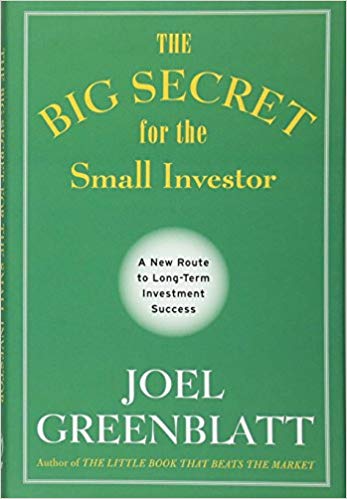 I put this book first because I believe that this is the best one to start with. Joel Greenblatt is a great investor with impressive results, but also he is an adjunct professor. He is a great teacher, because he possesses superior applied knowledge and combines it with his ability of easily transferring it in an enjoyable way. In his book, he reveals the secret to successful investing, “the big secret”, which is based on simple concepts, but also explains why it is difficult for most people to follow it, and that it is not a matter of intelligence.
I put this book first because I believe that this is the best one to start with. Joel Greenblatt is a great investor with impressive results, but also he is an adjunct professor. He is a great teacher, because he possesses superior applied knowledge and combines it with his ability of easily transferring it in an enjoyable way. In his book, he reveals the secret to successful investing, “the big secret”, which is based on simple concepts, but also explains why it is difficult for most people to follow it, and that it is not a matter of intelligence.
Then, he talks about the mutual funds, why most fund managers can’t beat the market, and why it is difficult to identify the best of them. He highlights the fact that participants even in the best funds do not have good results, because they come in and leave at the wrong time. Finally, he talks about the index funds and some of the issues that arise when stocks that compose them get overvalued. An example of the basic ideas presented in his book is that the best strategies do not work, every week, every month, and every year, and that is why they work well in the long-term. If they always worked, everybody would follow them, and subsequently those strategies would stop working.
Before reading this book you might try Greenblatt’s other book, “The Little Book That Still Beats the Market”. I liked very much the first part of it, because he explains investing like he is talking to a small child. However, in the second part he promotes the “Magic Formula” which is great, but very specific and not appropriate for everyone. Thus, I think that the “Big Secret” is a greater book for starters overall.
The Intelligent Investor, by Benjamin Graham (2)
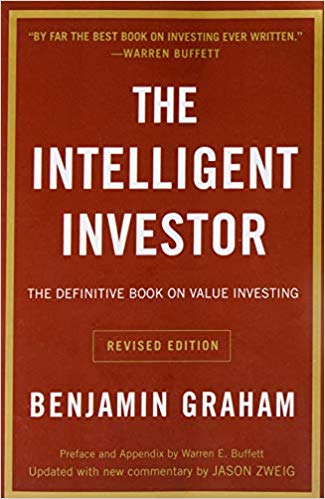 It is considered to be the “bible of investing”. Despite the fact that it was written 70 years ago, it is still very relevant. The author, Benjamin Graham, was the mentor of Warren Buffett who is the best investor alive and one of the richest people in the world. Other students that also attended Benjamin Graham’s classes generated excessive long-term returns, as described well in this 1984’s paper, “The Superinvestors of Graham and Doddsville”. You should already suspect that this book is a real treasure.
It is considered to be the “bible of investing”. Despite the fact that it was written 70 years ago, it is still very relevant. The author, Benjamin Graham, was the mentor of Warren Buffett who is the best investor alive and one of the richest people in the world. Other students that also attended Benjamin Graham’s classes generated excessive long-term returns, as described well in this 1984’s paper, “The Superinvestors of Graham and Doddsville”. You should already suspect that this book is a real treasure.
Graham says that the kind of intelligence investing demands “is a trait more of the character than of the brain.” The book makes a distinction between investing and speculation, and then covers a lot of topics about stocks and bonds. It will help you think of stocks as pieces of real businesses and yourself as a business owner.
About stock market volatility, it uses the allegory of Mr. Market, a manic-depressive who sometimes offer to sell or buy in extremely high prices and other times in very low prices. The investor should not worry about predicting his mood — fluctuations in the markets —, like speculators do, but he should take advantage of him and choose to buy valuable stocks when he is depressed and prices are very cheap.
Another important concept presented is the “margin of safety”, which is related with buying stocks much lower than their intrinsic value. This acts as a safety net for errors and is considered to be the secret of sound investment. Stocks are becoming riskier as their prices rise and less risky as their prices fall.
I would consider this book as the best book to read about investing. However, some may think of it as heavy and extended. Especially, people not highly interested in investing may find it boring, since it was written in a period that books were not competing for attracting readers. I believe that if you have already read a lighter and modern book, like those of Greenblatt, then you would be able to really enjoy its wisdom.
The Education of a Value Investor, by Guy Spier (3)
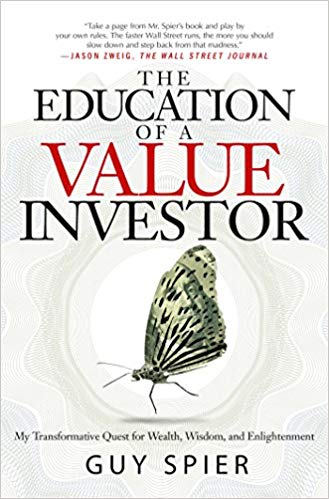 You have already started understanding that the philosophy of thinking matters most in investing. So, you should not worry for the fact that this third book proposed here will teach you almost nothing about investing methods and techniques. However, it is a great autobiographical book of value investor, Guy Spier, that will inspire you like no other, and help you keep at the “right path”. In any case, you will enjoy it as a story. Guy Spier is known for winning, together with his friend and investor Mohnish Pabrai, a lunch with Warren Buffet by bidding $650,000, a moment of his life that covers extensively in the book.
You have already started understanding that the philosophy of thinking matters most in investing. So, you should not worry for the fact that this third book proposed here will teach you almost nothing about investing methods and techniques. However, it is a great autobiographical book of value investor, Guy Spier, that will inspire you like no other, and help you keep at the “right path”. In any case, you will enjoy it as a story. Guy Spier is known for winning, together with his friend and investor Mohnish Pabrai, a lunch with Warren Buffet by bidding $650,000, a moment of his life that covers extensively in the book.
Guy started his career working for a company that would make deals seem more profitable than they actually were in order to attract investors. In those environments, when you are a new employee it is difficult to say “no”. The book teaches the lesson that you should never sacrifice your morals for a job, and illustrates Guy Spier’s long path, from escaping this environment to finally becoming an educated value investor.
An idea presented in the book is that after adopting the value investing philosophy, you will become not only a better investor but also a better person. Guy is not afraid to accept and talk openly about his mistakes. He thinks that you should be authentic and not try to imitate others, but equally keep an open mind and learn from them.
From this book you will get a lot of lessons for the mindset you should have in life and investing. A great book for investors and also for people that they are interested to work in the financial industry.
One Up On Wall Street, by Peter Lynch (4)
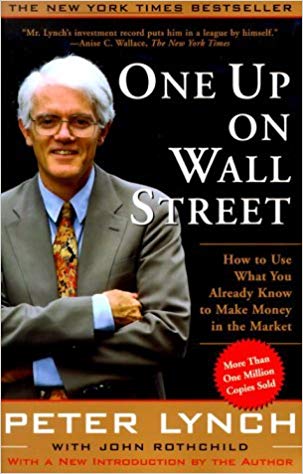 As the manager of the Maggellan fund between 1977 and 1990, Peter Lynch realized an incredible 29.2% annual return. In the book, he gives practical advice and examples for picking the right stocks. He supports that instead of listening to the analysts or trying to predict the market and the economy, you should focus on what you know, like companies and industries that you are familiar with. However, he thinks that this is not enough, and that you should do your homework, by digging in and doing the research, as well.
As the manager of the Maggellan fund between 1977 and 1990, Peter Lynch realized an incredible 29.2% annual return. In the book, he gives practical advice and examples for picking the right stocks. He supports that instead of listening to the analysts or trying to predict the market and the economy, you should focus on what you know, like companies and industries that you are familiar with. However, he thinks that this is not enough, and that you should do your homework, by digging in and doing the research, as well.
A good contribution of this book is that it distinguishes the stocks in six broad categories that have different characteristics: slow growers, stalwarts, fast growers, cyclical, turnourounds, asset-plays. It contains examples and information on how to recognise them, how to evaluate them, and what to expect from them.
I find it as the most practical of all other books in the list. Through the examples, it will help you think further, and comprehend the theoretical knowledge that you will receive from the other books.
The Most Important Thing, by Howard Marks (5)
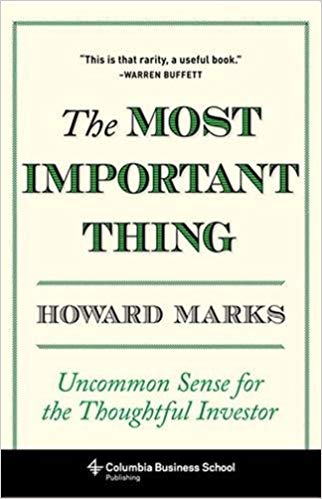 The author is so exceptional in his thinking. According to Buffett, “When I see memos from Howard Marks in my mail, they’re the first thing I open and read.”
The author is so exceptional in his thinking. According to Buffett, “When I see memos from Howard Marks in my mail, they’re the first thing I open and read.”
This book does not provide technical knowledge, but concepts of thinking that are revolutionary and extremely valuable. In the intro of the book Howards Marks says, that he would be glad if readers would say, “I’ve never thought of it this way”. I think he has accomplished his goal. Through the years, I have read dozens of books, so most of the time, more or less, I am familiar with investing concepts described. But, while I was reading “The Most Important Thing”, I said many times, “Oh, God, I had not thought of it that way!”. This book goes to another level and it is the one that has changed my thinking as an investor and impressed me like no other.
It is a collection of comments and thoughts from Howard Marks’s memos. Each chapter covers one “most important thing” of the twenty one in total. He illustrates the importance of “second level thinking”, and talks among others about being aware of cycles and understanding, value and risk. Knowing what you don’t know, the role of luck, and contrarianism are subjects that are also analyzed.
However, while less experienced investors will still find it useful, I think that they will not be able to appreciate the full depth of the wisdom provided. You will need some advanced knowledge and experience, that demands some years of practising investing. So, if you are a starter, I still recommend reading this book, but please do not forget to re-read it in five or ten years. I believe it will be a totally different experience, and that is when you will finally be able to appreciate its enormous value.
I thought a lot which would be the best 5, and I feel sad that some great books are out of the list. It would be a shame if I did not make a quick reference for “The Dhandho Investor” of Mohnish Pabrai, and the “Margin of Safety” of Seth Klarman, a collectible that its printed version costs a lot!
In addition, If you prefer videos over books, search Youtube for speeches and interviews of some exceptional investors like Warren Buffett, Joel Greenblatt, Seth Klarman, Mohnish Pabrai, Howard Marks, Guy Spier and Tobias Carlisle. Also, subscribe to Investorblog’s youtube channel here. I am planning to make more videos with educational content, investing thoughts and case studies.
In summary, this is the list of the 5 best books presented in the article.
(1) the one to start with – The Big Secret for the Small Investor, by Joel Greenblatt
(2) the “bible” of investing – The Intelligent Investor, by Benjamin Graham
(3) the most inspiring story – The Education of a Value Investor, by Guy Spier
(4) the most practical – One Up On Wall Street, by Peter Lynch
(5) the mind-changing one, if you are already advanced.- The Most Important Thing, by Howard Marks
Start your free 30-day trial with Amazon Audible and enjoy the best investing books as Audiobooks, or use Kindle Unlimited 30-day free trial. As an Amazon Associate I earn from qualifying purchases.
If you find the list of the books and the information provided useful and appreciate the effort, share the article with your friends and on social media. Sharing is caring!
Dimitrios Koutsoubos
*Content presented on Investorblog does not present any recommendation for stock transactions. All investors are advised to conduct their own independent research into individual stocks before making a purchase decision.
Ελληνικά

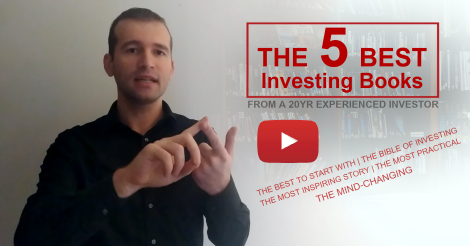

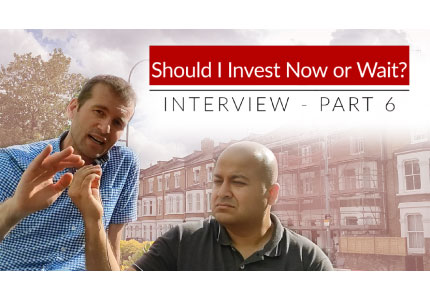




Tony
I started following you on SA and I appreciate your style, well versed in the fundamentals, avoiding conjecture and hyperbole. I am particularly interested in your insights on Greek businesses, I am expanding my exposure to the European market which I believe is underestimated vis a vis the frothy US market. Dont get me wrong, I am by no means a bear on the US economy which has more than a few tricks up her sleeve but your excellent article on Zoom highlights the issue with overvalued mega-caps.
This is an excellent list (I need to get onto Greenblatt’s and Spiers’ titles), i agree wholehartedly, Marks is a true philosopher, his insights extend beyond investing and I am an avid reader of his memo’s too.
Anyhow, thanks for all your work and I hope you are doing well and staying safe in these unusual times.
Dimitrios Koutsoubos
Tony, thank you for the kind words.
Greece has been a paradise for value investors for the previous 10 years. Now, I cannot find the obviously cheap stuff that I could find. However, I still own some asset plays and some growth at reasonable price.
A good fact for the Greek stock market is that the companies that have managed to survive the crisis are really tough and tested in harsh conditions.
I find better valuations in the UK, but I have realized that the LSE is more efficient as a market. Also, the economy is competitive and very dynamic, so the analysis must be deeper. For me it is a learning period, but I feel optimistic for the UK.
I will be happy to have you here!